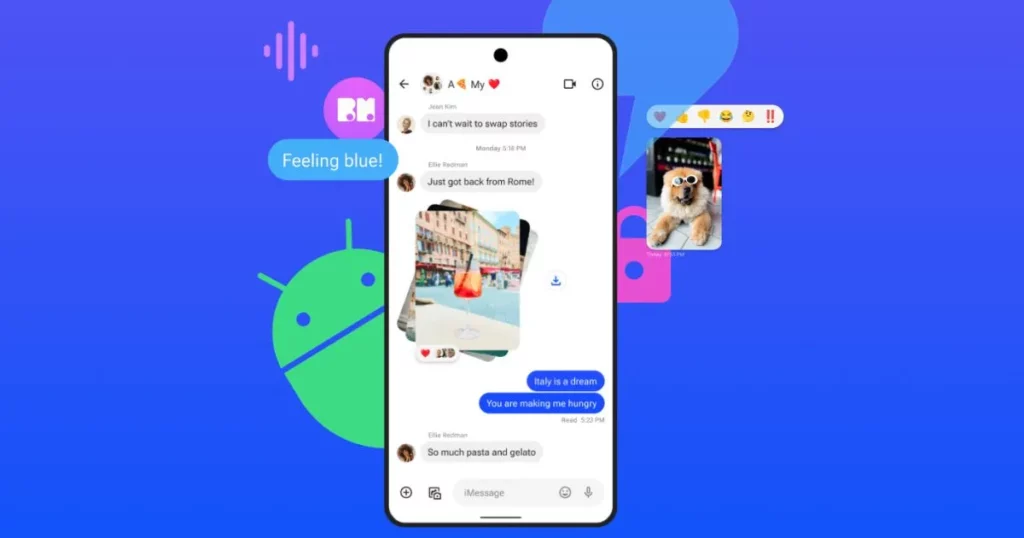Apple puts a halt of Beeper Mini’s iMessages for Android for the safety of its users
Friday Afternoon Disruption
On a Friday afternoon, users relying on Beeper Mini for Android were surprised by an abrupt service interruption. The unexpected halt in functionality of Beeper Mini, an app designed to facilitate iMessage usage on Android devices, immediately caught the attention of Apple. In response to the disruption, Apple swiftly confirmed the adoption of stringent security measures. These measures aimed to protect users by actively preventing the exploitation of falsified credentials used to gain unauthorized access to the iMessage platform.
Apple’s Security Concerns
According to a statement provided to 9to5Mac, Apple highlighted the significant security and privacy risks posed by Beeper Mini’s techniques. Originally functioning by routing iMessage through a Mac, Beeper’s latest iteration, Beeper Mini for Android, takes a direct approach to exploit iMessage. This new method directly connects to Apple’s service, bypassing intermediary servers, raising concerns about potential metadata exposure and susceptibility to unwanted messages, spam, and phishing attacks.
Unverified Security Claims
Apple emphasized the challenge present in verifying the security protocols governing messages transmitted via Beeper Mini. Their focus predominantly centered on the complexities surrounding two critical aspects: the maintenance of end-to-end encryption and strict access control measures.
The base of the issue lies in the unique method employed by Beeper Mini, which traverses a direct path to Apple’s iMessage service without the intermediary of servers. This approach, while attempting to streamline communication, raises fundamental concerns about security. Apple expressed reservations about the strong nature of end-to-end encryption within this direct channel, expressing uncertainty over the app’s ability to ensure an unbreachable encryption layer from the sender to the recipient.
Apple’s verification wasn’t merely based on doubt but rather a detailed assessment of the intricate interplay between security layers. It highlighted the details associated with verifying and sustaining the integrity of encrypted messaging when routed through an unconventional path like Beeper Mini. The concerns raised by Apple reflected the gravity of the challenge in preserving end-to-end encryption standards while ensuring strict access controls in an environment that deviates from the established protocols.
Ultimately, Apple’s emphasis on these potential vulnerabilities sought to draw attention to the delicate balance between accessibility and security.
Beeper’s Defense
In response to concerns raised by Apple regarding the security implications of Beeper Mini, Beeper took a proactive stance to defend the integrity and strength of its app’s security measures. Firmly standing behind its product, Beeper asserted that Beeper Mini significantly augments message privacy and security levels, especially when compared with the inherent vulnerabilities of unencrypted SMS communication.
In a gesture of transparency and confidence, Beeper went a step further by extending an open invitation to validate its claims. The company took the bold step of offering its entire source code for comprehensive scrutiny by an impartial third party mutually agreed upon. This offer aimed to affirm the robustness and credibility of Beeper Mini’s security architecture. By subjecting its source code to external evaluation, Beeper exhibited a commitment to transparency and accountability, fostering trust and confidence among its user base and industry observers.
This move not only underscored Beeper’s confidence in its app’s security mechanisms but also signaled a willingness to engage in a collaborative and constructive dialogue about the app’s functionality and safeguards. The invitation for a comprehensive third-party review sought to reassure users and stakeholders alike, positioning Beeper as a company dedicated to continuous improvement and user-centric security enhancement.

Current Status and Measures
As of now, Beeper Cloud has been re-enabled, while the company actively works on resolving the issues with Beeper Mini. To mitigate potential user charges during the downtime, Beeper took proactive steps by deregistering Android phone numbers and extending the trial period.
Apple’s Ongoing Commitment
Apple reaffirmed its unwavering dedication to prioritizing user safety by emphasizing its ongoing commitment to fortify security measures. This pledge was underscored by the announcement of forthcoming updates, including the introduction of iMessage Contact Key Verification within the highly anticipated iOS 17.2.
The reconfirmation of Apple’s commitment signified a proactive stance toward continually enhancing user protection in the realm of digital communication. Understanding the evolving landscape of cybersecurity threats, Apple aimed to go beyond mere assurances, striving to tangibly augment the protective layers embedded within its ecosystem.
Apple’s commitment, echoed through the promise of ongoing updates and the imminent launch of iOS 17.2 with Contact Key Verification, epitomized the company’s tireless dedication to staying ahead of evolving security challenges and prioritizing user safety at the forefront of its technological advancements.



